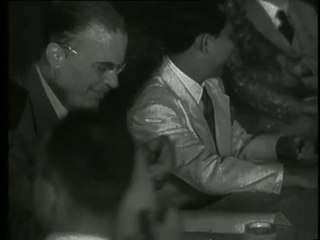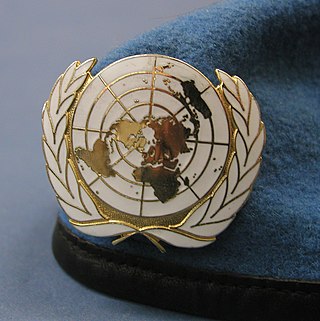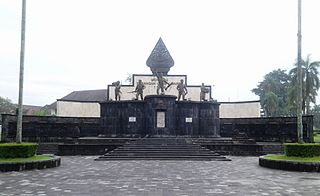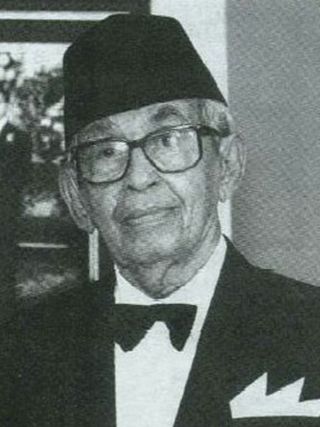
The United Nations Truce Supervision Organization (UNTSO) is an organization founded on 29 May 1948 for peacekeeping in the Middle East. Established amidst the 1948 Arab–Israeli War, its primary task was initially to provide the military command structure to the peacekeeping forces in the Middle East to enable the peacekeepers to observe and maintain the ceasefire, and in assisting the parties to the Armistice Agreements in the supervision of the application and observance of the terms of those Agreements. The organization's structure and role has evolved over time as a result of the various conflicts in the region and at times UNTSO personnel have been used to rapidly deploy to other areas of the Middle East in support of other United Nations operations. The command structure of the UNTSO was maintained to cover the later peacekeeping organisations of the United Nations Disengagement Observer Force (UNDOF) and the United Nations Interim Force in Lebanon (UNIFIL) to which UNTSO continues to provide military observers.

The Indonesian National Revolution, also known as the Indonesian War of Independence, was an armed conflict and diplomatic struggle between the Republic of Indonesia and the Dutch Empire and an internal social revolution during postwar and postcolonial Indonesia. It took place between Indonesia's declaration of independence in 1945 and the Netherlands' transfer of sovereignty over the Dutch East Indies to the Republic of the United States of Indonesia at the end of 1949.
The United Nations General Assembly Resolution 194 is a resolution adopted near the end of the 1947–1949 Palestine war. The Resolution defines principles for reaching a final settlement and returning Palestine refugees to their homes. Article 11 of the resolution resolves that
refugees wishing to return to their homes and live at peace with their neighbours should be permitted to do so at the earliest practicable date, and that compensation should be paid for the property of those choosing not to return and for loss of or damage to property which, under principles of international law or equity, should be made good by the Governments or authorities responsible.

A ceasefire, also spelled cease fire, is a stoppage of a war in which each side agrees with the other to suspend aggressive actions. Ceasefires may be between state actors or involve non-state actors.

Hubertus Johannes "Huib" van Mook was a Dutch administrator in the East Indies. During the Indonesian National Revolution, he served as the Acting Governor-General of the Dutch East Indies from 1942 to 1948. Van Mook also had a son named Cornelius van Mook who studied marine engineering at the Massachusetts Institute of Technology. He also wrote about Java - and his work on Kota Gede is a good example of a colonial bureaucrat capable of examining and writing about local folklore.

The Linggardjati Agreement was a political accord concluded on 15 November 1946 by the Dutch administration and the unilaterally declared Republic of Indonesia in the village of Linggajati, Kuningan Regency, near Cirebon in which the Dutch recognised the republic as exercising de facto authority in Java, Madura, and Sumatra.

The Renville Agreement was a United Nations Security Council-brokered political accord between the Netherlands, which was seeking to re-establish its colony in Southeast Asia, and Indonesian Republicans seeking Indonesian independence during the Indonesian National Revolution. Ratified on 17 January 1948, the agreement was an unsuccessful attempt to resolve the disputes that arose following the 1946 Linggadjati Agreement. It recognised a cease-fire along the Status Quo Line or so-called "Van Mook Line", an artificial line that connected the most advanced Dutch positions.
The United Nations Conciliation Commission for Palestine (UNCCP) or Palestine Conciliation Commission (PCC) was created by UN-resolution 194 of December 11, 1948, with the aim of mediating in the Arab–Israeli conflict. The Commission consisted of France, Turkey and the United States, and its official headquarters was set up in Jerusalem on January 24, 1949. The commission met separately with Israeli and Arab governments from February 12–25, 1949, with Muhammad Nimr al-Hawari of the General Refugee Congress (GRC) and a Palestinian refugee delegation on March 21 in Beirut, and on April 7 in Tel Aviv with Israeli prime minister David Ben-Gurion. It then proposed the Lausanne Conference of 1949.

The United Nations has played an advisory role in maintaining peace and order in the Kashmir region soon after the independence and partition of British India into the dominions of Pakistan and India in 1947, when a dispute erupted between the two new States on the question of accession over the princely state of Jammu and Kashmir. India took this matter to the UN Security Council, which passed resolution 39 (1948) and established the United Nations Commission for India and Pakistan (UNCIP) to investigate the issues and mediate between the two new countries. Following the cease-fire of hostilities, it also established the United Nations Military Observer Group in India and Pakistan (UNMOGIP) to monitor the cease-fire line.

Operation Kraai was a Dutch military offensive against the de facto Republic of Indonesia in December 1948, following the failure of negotiations. With the advantage of surprise, the Dutch managed to capture the Indonesian Republic's temporary capital, Yogyakarta, and seized Indonesian leaders such as de facto Republican President Sukarno. This apparent military success was, however, followed by guerrilla warfare, while the violation of the Renville Agreement ceasefire diplomatically isolated the Dutch. This led to the Dutch–Indonesian Round Table Conference and recognition of the United States of Indonesia.
United Nations Security Council Resolution 41, adopted on February 28, 1948, commended both parties in the Indonesian National Revolution for the recent signing of a truce and attempts to comply with United Nations Security Council Resolution 27, repeated the offer of mediation made in United Nations Security Council Resolution 31, and requested the Committee of Good Offices keep them informed as to the progress of political settlement in the Indonesia.
United Nations Security Council Resolution 47, adopted on 21 April 1948, concerns the resolution of the Kashmir conflict. After hearing arguments from both India and Pakistan, the Council increased the size of the UN Commission created by the former Resolution 39 to five members, instructed the Commission to go to the subcontinent and help the governments of India and Pakistan restore peace and order to the region and prepare for a plebiscite to decide the fate of Kashmir.
United Nations Security Council Resolution 55, adopted on July 29, 1948, having receiving a report from the Committee of Good Offices about a standstill in political and trade negotiations in Indonesia, the Council called upon the governments of the Netherlands and the Republic of Indonesia to maintain strict observance of both the military and economic elements of the Renville Agreement and to implement early and fully its twelve political principles.
United Nations Security Council Resolution 63, adopted on December 24, 1948, in response to a report by the Committee of Good Offices the Council called upon the parties to cease hostilities and to release the President of the Republic of Indonesia and other political prisoners arrested since December 18, 1948.

The Dutch–Indonesian Round Table Conference was held in The Hague from 23 August to 2 November 1949, between representatives of the Kingdom of the Netherlands, the Republic of Indonesia and the Federal Consultative Assembly, representing various states the Dutch had created in the Indonesian archipelago.

The State of Pasundan was a federal state (negara bagian) formed in the western part of the Indonesian island of Java by the Netherlands in 1948 following the Linggadjati Agreement. It was similar to the geographical area now encompassed by the current provinces of West Java, Banten and Jakarta.

The United States of Indonesia was a short-lived federal state to which the Netherlands formally transferred sovereignty of the Dutch East Indies on 27 December 1949 following the Dutch–Indonesian Round Table Conference. This transfer ended the four-year conflict between Indonesian nationalists and the Netherlands for control of Indonesia. It lasted less than a year, before being replaced by the unitary Republic of Indonesia.

The General Offensive of 1 March 1949 was a military offensive during the Indonesian National Revolution where the city of Yogyakarta was held by Indonesian troops for six hours. This played an important role in causing international pressure to be exerted on the Netherlands.

Hamid Algadri or Hamid Al-Gadri was an Indonesian independence fighter and was meritorious in negotiating the Linggadjati Agreement, Renville Agreement, Dutch–Indonesian Round Table Conference and one of the members of parliament in the founding days of the Republic of Indonesia.

The United Nations Commission for Indonesia was a United Nations commission formed to replace the Good Offices Commission known in Indonesian as Komisi Tiga Negara. The purpose of UNCI was to continue the duties of the previous commission, while at the same time overseeing the handover of the Indonesian territory to the republican government and reporting regularly to the United Nations Security Council. UNCI was formed after the Good Offices Commission was deemed to have failed to reconcile the conflict. UNCI played an important role in the Dutch–Indonesian Round Table Conference.












